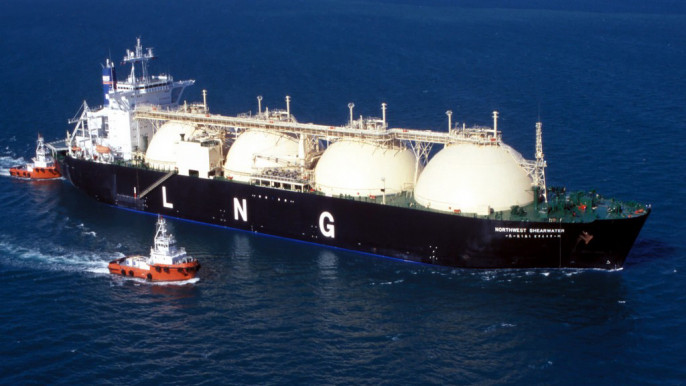Economists shared a positive economic outlook regarding Qatar as a major exporter of liquified natural gas (LNG).
Qatar and the United States have topped global exports of LNG in 2022 in light of the energy crisis amid the ongoing war in Ukraine, Bloomberg revealed on Tuesday based on ship-tracking data.
The report found that Doha and Washington exported 81.2 million tonnes of LNG, a figure that represented what Bloomberg described as “a modest increase” for the Gulf state.
The data also showed a major increase for the US, which had expanded its exports in 2016, leading it to become a key supplier on a global scale.
Last year saw Europe grapple with an energy crisis following Russia’s war on Ukraine, causing many countries in the region to turn to Qatar and the US in an effort to reduce their reliance on Moscow’s gas.
Europe previously received 40% of its gas supplies from Moscow as almost a third of shipments passed through Ukraine.
In December 2021, Bloomberg reported that the US surpassed LNG giant Qatar in global exports for the first time. Washington ramped up its exports at the time through the Sabine Pass—the US’ biggest LNG export plant—and Freeport facilities.
Analysing this year’s figures, the news agency said that the fire at the Freeport export plant in Texas was an obstacle in the US’ achieving global dominance of exports. The fire led to the closure of the plant in June, though it is set to get back to business this month.
Meanwhile, Qatar is leading the LNG race through its mega multibillion-dollar North Field Expansion project.
The project is expected to increase Qatar’s LNG production capacity to 126 million tonnes per annum by 2027.
State-owned energy company QatarEnergy is also set to become the world’s largest trader of LNG within the next decade.
“We are trading about 5-10 million (tonnes of LNG) now. We will be, in the next 5-10 years, the largest LNG trader in the world by far. This is ours and third-party (volumes),” said Saad Sherida Al-Kaabi, also Qatar’s Minister of State for Energy Affairs, as quoted by Reuters in October.
In December, Qatar reported a total revenue of 81.8 billion QAR for the third quarter of 2022. Oil and gas made up 76.3 billion QAR of the total reported, per figures shared by Doha’s state-news agency.
The oil and gas revenues have reached 117.6 billion QAR in comparison to 70.4 billion QAR reported in the first half of 2021, showing a total 67% spike.
The energy sector is also among the leading factors that will keep Qatar’s economy afloat amid concerns by the International Monetary Fund of a new global recession in 2023.
Economists told Doha News that Qatar’s economy will continue to expand “at a healthy pace” despite a potentially slow GDP growth.
“Qatar’s economy will continue to expand at a healthy pace, although real GDP growth will slow from about 5.5% in 2022 to about 3.7% in 2023,” Adnane Allouaji, GCC economist, told Doha News.
Allouaji explained that Qatar benefitted last year from the hydrocarbons sector activity, most notably the LNG trade and investment.
“Ongoing major investment in energy infrastructure will continue to drive the economy in 2023, including increased capital investment by QatarEnergy (the state-owned oil and gas company), Qatargas, and Nakilat,” the economist said.







